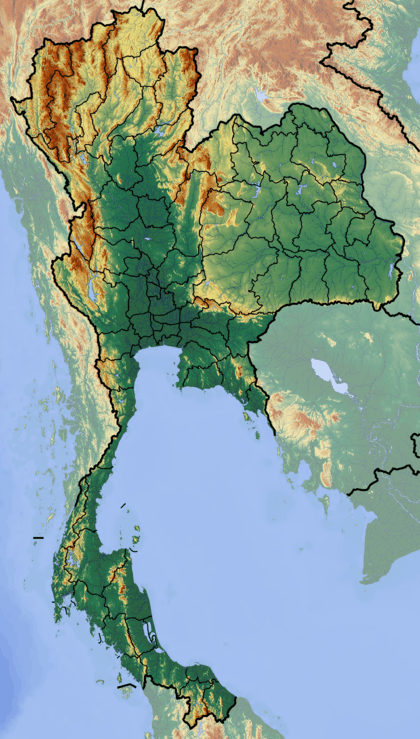Namtok Sam Lan National Park
| Namtok Sam Lan National Park | |
|---|---|
| อุทยานแห่งชาติน้ำตกสามหลั่น | |
|
IUCN category II (national park) | |
|
Near visitor centre | |
 Park location in Thailand | |
| Location | Saraburi Province, Thailand |
| Nearest city | Saraburi |
| Coordinates | 14°26′14″N 100°57′47″E / 14.43722°N 100.96306°ECoordinates: 14°26′14″N 100°57′47″E / 14.43722°N 100.96306°E |
| Area | 45 km2 (17 sq mi) |
| Established | June 1981 |
| Governing body | Department of National Parks, Wildlife and Plant Conservation |
Namtok Sam Lan National Park (Thai: อุทยานแห่งชาติน้ำตกสามหลั่น) is a national park in Saraburi Province, Thailand. Other names for the park include Khao Sam Lan National Park and Phra Puttachai National Park. Home to waterfalls, reservoirs and forests, the park is located near the cave temple Wat Phra Puttachai.
Geography
Namtok Sam Lan National Park is located about 6 kilometres (3.7 mi) south of Saraburi town. The park's area is 45 square kilometres (17 sq mi) encompassing parts of four districts: Kaeng Khoi District, Nong Khae District, Wihan Daeng District and Mueang District. The highest point is the viewpoint on Khao Khrok peak at 329 metres (1,079 ft).[1]
History
During World War II, the Japanese Army occupied and used this area as an encampment, entailing the destruction of some of the park's forests. In 1960 the Thai government began the restoration of this forest and designated it a conservation area. On 2 June 1981, Namtok Sam Lan was designated a National Park.[1]
Attractions
The park's best-known attractions are its waterfalls. The park's namesake Sam Lan Waterfall has three levels, each of about 5 metres (16 ft). Other waterfalls include Pho Hin Dat, Roi Kueak Ma and Ton Rak Sai.[1]
Park reservoirs include Khao Samlan, Khaoruak and Sub Plakung.[1]
Flora and fauna
Namtok Sam Lan's forest consists of deciduous and mixed forest. Tree species include ironwood, Burmese ebony, Siamese sal and makha. Other vegetation includes bamboo, rattan and orchid.[1]
Animal species include pheasant, jungle fowl, barking deer, mouse deer, wild boar and squirrel. Avian life is believed to have once included the white-eyed river martin, a native of northern Thailand now considered extinct. The park is also noted for its various butterfly species.[1][2]

